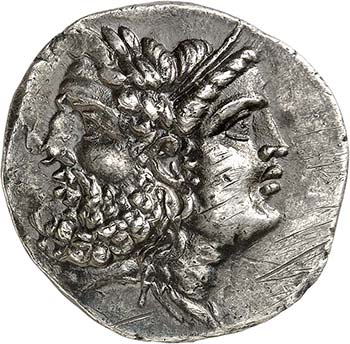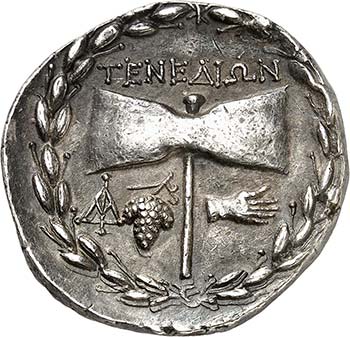- Home
- Numismatic Auction 18
- 39 Tenedos - Troas Tetradrachme (c.100-70). Très rare et ...
Lot 39 - Numismatic Auction 18
Bids
Description
Tetradrachme (c.100-70).
Très rare et d’un style exceptionnel - Quelques rayures à l’avers.
Exemplaire de la vente Gorny & Mosch 207 du 15 octobre 2012, N°290.
16.68g - F. de Callataÿ, Les monnaies hellénistiques en argent de Ténédos, Studies Price, 15.
Superbe - AU fine style
Coinage in Tenedos was a long-established tradition when this coin was struck, the earliest ones dating from the late 6th-century BC. These earliest ones already presented a double-headed bust on the obverse, with a female face on the right and a (bare) male one on the left, and a double-headed axe on the reverse (labrys). This double duality evokes the history of the city, said to have been founded by Tenes, the son of the king of Kolonai, and his step-mother, who were accused of being lovers, and condemned to be thrown in the sea whilst imprisoned in a chest: they landed on the island of Leukophrys, of which Tenes became ruler and which took his name (Cicero, De natura deorum II.15.39 writes that he was deified). An archaic law condemned adulterous couples to be executed with a labrys, and this was the theory of Aristotle himself to explain this unusual coin design, but it seems unlikely, more so than another version of the mythology that tell us that Tenes was falsely accused of having raped an otherwise unknown woman and was condemned with his sister rather than his stepmother (in that version the king of Kolonai finally learned the truth and sailed to Leukophrys, but Tenes expressed his unwillingness to forgive by cutting the moorings of his father’s boat with an axe), so the coin’s reverse could also copy the shell of a local type of crab, which might have been used for some form of barter-currency before coinage. The laurel wreath on the male head, which appeared at the end of the 5th-century BC, suggests that the janiform couple depicts Zeus and Hera (with a stephane / diadem), though it is tempting – as there is vine on the reverse – to recognise two heads of Dionysos. This later issue, with its wreath around the axe, belongs to the Hellenistic stephanephoric (‘wreath-bearing’) coinages, Tenedos being only one of a number of cities that struck such large silver coins.
Please use the registration form to send us your participation request, or, if you are already registered and authorized, use the login box on the top.
For any information please contact palombo.geneve@gmail.com
Categories
Auction: Numismatic Auction 18
- Celtic and Greek Coins
- Roman Coins
- Ajman
- Albania
- Germany
- Great Britain
- Annam
- Saudi Arabia
- Kingdom of Araucanía and Patagonia
- Australia
- Austria
- Belgium
- Brasil
- Bulgaria
- Cambodia
- Canada
- China
- Colombia
- Croatia
- Cuba
- Egypt
- United Arab Emirates
- Spain
- France
- Gabon
- Greece
- Guatemala
- Haiti
- Honduras
- Hungary
- French India
- Netherlands India
- Portuguese India
- French Indochina
- Iraq
- Iran
- Italy
- Lebanon
- Liechtenstein
- Malta
- Mexico
- Norway
- Netherlands
- Peru
- Poland
- Romania
- Russia
- San Marino
- Serbia
- Sweden
- Switzerland
- Transylvania
- Tunisia
- Usa
- Vatican
- Yugoslavia
Timetable
Pre-bidding - End
17 11 2019 14:00 CET
Room auction - Start
17 11 2019 16:00 CET
Contacts
Rue de la cité, 27, Genève, 1204, Switzerland
Cabinet Numismatique - Maison Palombo S.A. /// Rue de la cité, 27 - 1204 Genève - Suisse
tel : 0041-(0)22-310-91-97 /// fax : 0041-(0)22-310-30-74 /// Email : palombo.geneve@gmail.com /// www.maison-palombo-geneve.com
Powered by bid-KIT®
 Respecting your privacy is our priority
Respecting your privacy is our priority
This site uses cookies to improve user experience and to collect information on the use of the site. You can read our cookie policy, accept all cookies and continue browsing by clicking on "Accept" or customize your choice by clicking on "Customize".
Cookie Policy
Cookies
To make this site work properly, we sometimes install small data files called "cookies " on your device. Most of the big sites do the same.
What are cookies?
A cookie is a small text file that websites save on your computer or mobile device while you visit them. Thanks to cookies, the site remembers your actions and preferences (for example login, language, font size and other display settings) so that you do not have to re-enter them when you return to the site or browse from one page to another.
How do we use cookies?
Third party cookies
Google Analytics
This site uses Google Analytics to collect information about the use of users of its website. Google Analytics generates statistical and other information through cookies, stored on users' computers. The information generated relating to our website is used to make reports on the use of websites. Googl
How to control and modify cookies?
You can modify or withdraw your consent at any time from the cookie declaration on our website.
Privacy Policy
Find out more about who we are, how you can contact us and how we process personal data in our privacy policy .
The necessary cookies help to make the website usable by enabling basic functions such as page navigation and access to protected areas of the site. The website cannot function properly without these cookies.
| Name | Supplier | Purpose | Expiry |
|---|---|---|---|
| cookieConsent | Bid Inside | Stores the user's cookie consent status for the current domain | 6 months |
| PHPSESSID | Bid Inside | Preserve the user's status in the different pages of the site. | When the browsing session ends |
| f_display | Bid Inside | The f_display cookies memorize the display mode chosen by the user in the pages where there are lists | When the browsing session ends |
| f_page | Bid Inside | The f_page cookies store the page viewed by the user in the pages where there are lists | When the browsing session ends |
| f_rec_page | Bid Inside | The f_rec_page cookies store the number of elements to be displayed per page chosen by the user in the pages in which there are lists | When the browsing session ends |
| f_order_by | Bid Inside | The f_order_by cookies store the sorting parameter selected by the user in the pages where there are lists | When the browsing session ends |
| f_order_dir | Bid Inside | The f_order_dir cookies store the ordering direction chosen by the user in the pages where there are lists | When the browsing session ends |
| watch_list_show_imgs | Bid Inside | The watch_list_show_imgs cookie stores the user's choice to show or hide lot images on the watch list page | When the browsing session ends |
| selected_voice | Bid Inside | The selected_voice cookie stores the voice selected by the user for the speech synthesis present in the live auction | 1 Month |
| include_autobids | Bid Inside | The include_autobids cookie stores the user's choice to show or hide their auto-bids on the 'Your bids' page | 6 months |
Analytical cookies help to understand how visitors interact with the website, collecting and transmitting statistical information to the Data Controller.
| Name | Supplier | Purpose | Expiry |
|---|---|---|---|
| _ga | Register a unique ID used to generate statistical data on how the visitor uses the website. | 2 years | |
| _gat_gtag | Used by Google Analytics to limit the frequency of requests | 1 day | |
| _gat | Used by Google Analytics to limit the frequency of requests | 1 day | |
| _gid | Register a unique ID used to generate statistical data on how the visitor uses the website. | 1 day | |
| __utma | Bid Inside | Used to distinguish users and sessions. The cookie is created when the javascript library executes and no existing __utma cookies exists. The cookie is updated every time data is sent to Google Analytics. | 2 years |
| __utmt | Bid Inside | Used to throttle request rate. | 10 minutes |
| __utmb | Bid Inside | Used to determine new sessions/visits. The cookie is created when the javascript library executes and no existing __utmb cookies exists. The cookie is updated every time data is sent to Google Analytics. | 30 minutes |
| __utmc | Bid Inside | Not used in ga.js. Set for interoperability with urchin.js. Historically, this cookie operated in conjunction with the __utmb cookie to determine whether the user was in a new session/visit. | When the browsing session ends |
| __utmz | Bid Inside | Stores the traffic source or campaign that explains how the user reached your site. The cookie is created when the javascript library executes and is updated every time data is sent to Google Analytics. | 6 months |
| __utmv | Bid Inside | Used to store visitor-level custom variable data. This cookie is created when a developer uses the _setCustomVar method with a visitor level custom variable. This cookie was also used for the deprecated _setVar method. The cookie is updated every time data is sent to Google Analytics. | 2 years |
Preference technical cookies allow a website to remember information that affects the way the site behaves or presents itself, such as your preferred language or the region you are in.
We do not use cookies of this type.Profiling cookies are used for marketing purposes, to monitor website visitors. The intent is to display relevant and engaging ads for the individual user.
We do not use cookies of this type.Unclassified cookies are cookies that are being classified, together with individual cookie providers.
We do not use cookies of this type.





 40
40